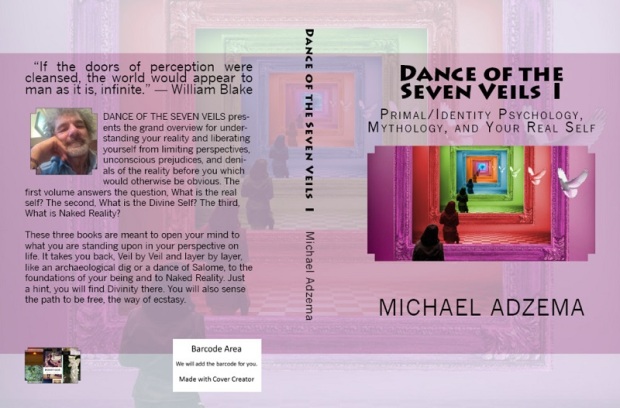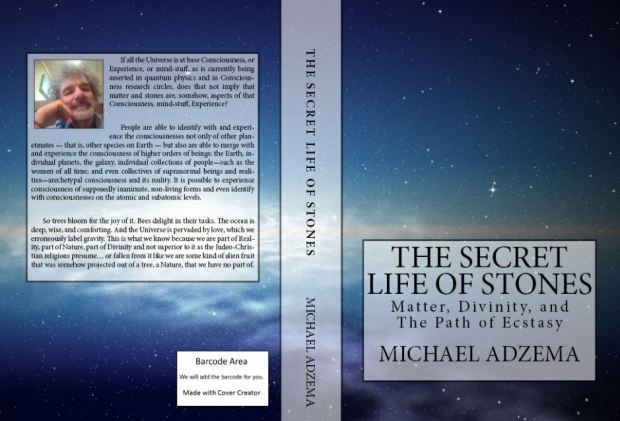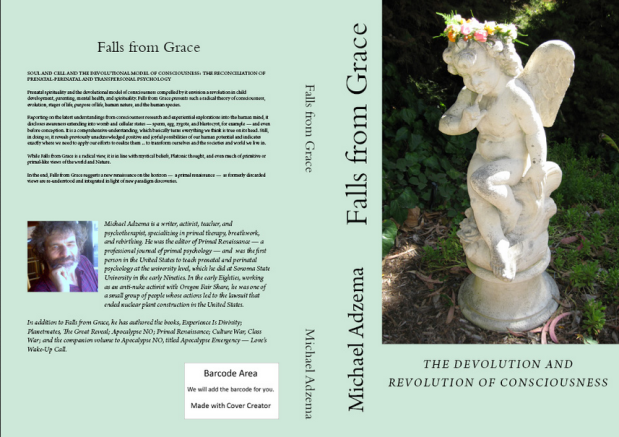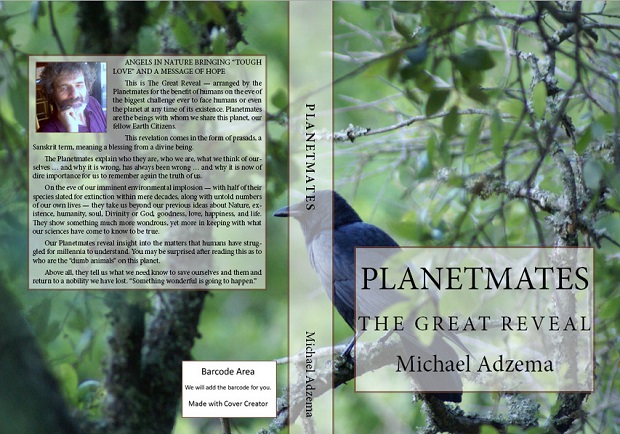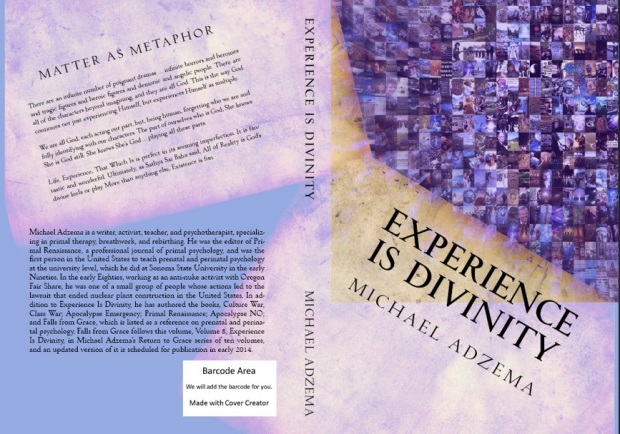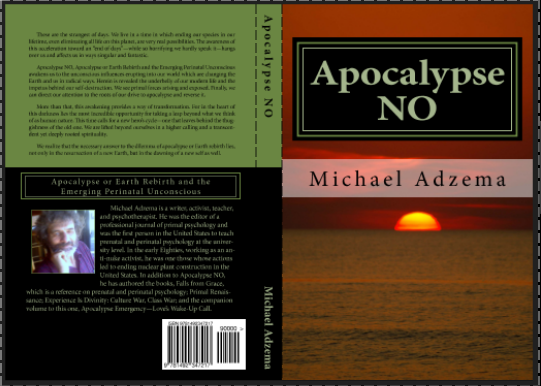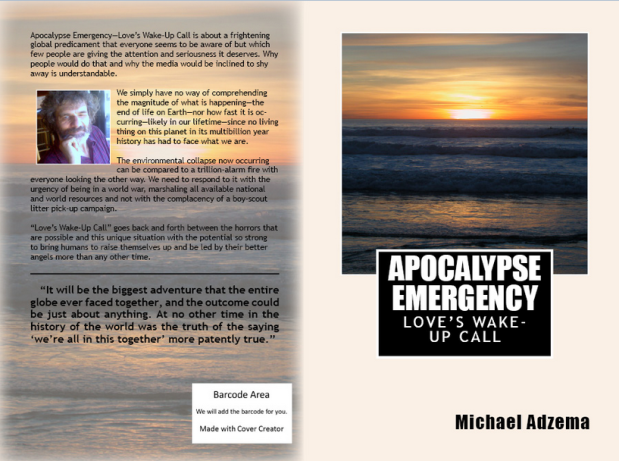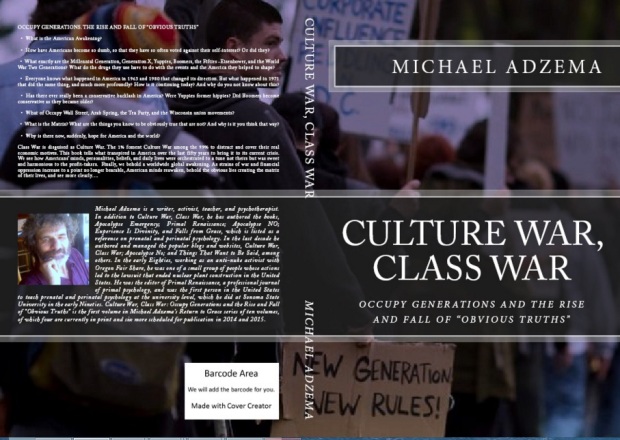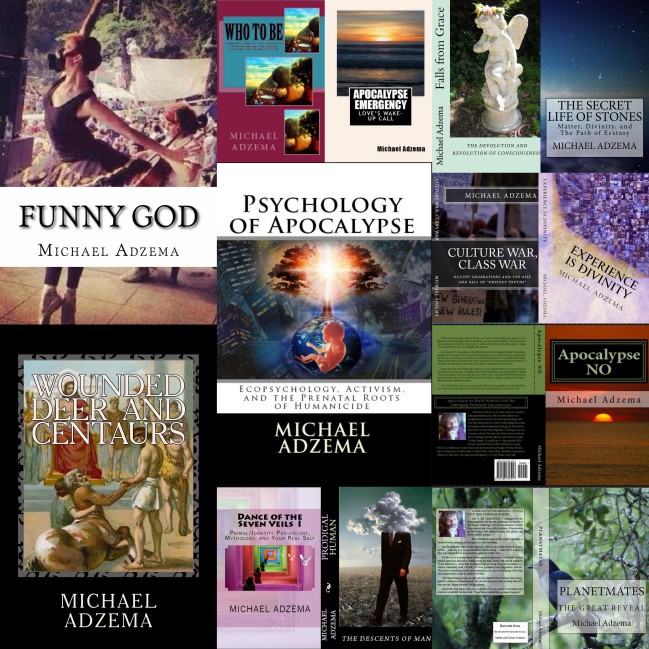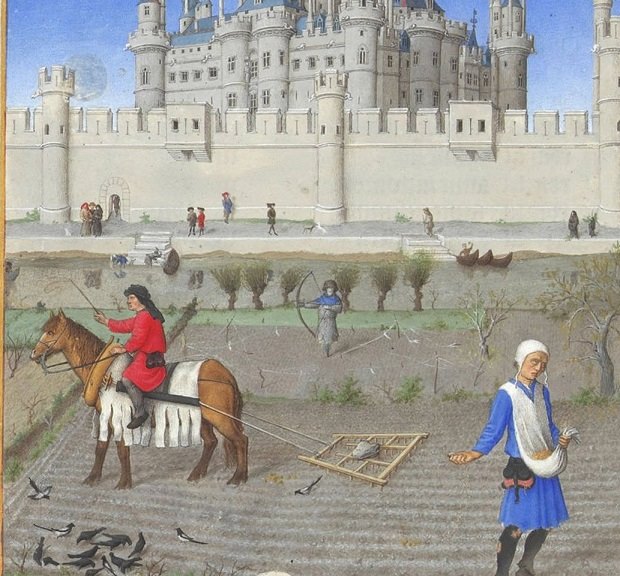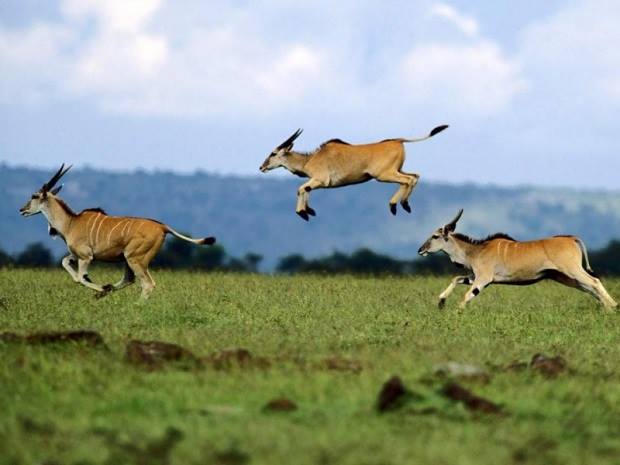Posts Tagged Religion
“we’ve built theologies out of our fears…created religions to soothe…deny our experiences…. It is the opposite of Reality”
Posted by sillymickel in books, Experience Is Divinity, Funny God, Michael Adzema author, religion, spirituality on September 16, 2015
“…we’ve built theologies out of our fears. We’ve created religions to soothe and deny our experiences … our Experience. Well, this has nothing to do with Reality. Indeed, in denial of our experience … and Experience … it is the opposite of it. The theologies and religions … and many spiritualities … have nothing to do with God, either. They take the most alive, profound, glorious, and exciting things imaginable (and unimaginable) and reduce them to nothing … and thus to something that is safe: A statue Jesus. A distant and unknowable God. An amorphous, boring, and bland Universal Consciousness. An impersonal detail of the physical world like light, vibration, or energy. All of which — in denial of what we truly feel about them and their coldness, abstractness, or emptiness — we call glorious, ultimate, grand … and loving. Like those heartless parental figures we wished had been there for us … but weren’t….”
– from “Funny God: The Tao of Funny God and the Mind’s True Liberation”
https://www.facebook.com/notes/10152683728223138/
See Michael Adzema on Amazon for any other of Michael Adzema’s books
http://www.amazon.com/Michael-Adzema/e/B00J7F0URC/ref=dp_byline_cont_book_1
#spirituality #religion #divinity #God #denial #follow #tsu #heartlessparents #fear #experience
“We’d rather think of God as being nothing…or devitalized…rather than heartless; like we feel Him to be, because of our experiences with authorities in childhood”
Posted by sillymickel in FunnyGod, Michael Adzema author, psychology, religion, spirituality, transpersonal psychology on September 15, 2015
“We’ve experienced meanness and cruelty in our early lives, so we imagine a Divine with no qualities at all. We say It is loving, but in an incomprehensible way and “from a distance.” So how loving … really … is someone who is distant? We don’t see ourselves as free and loved and forgiven … let alone, sinless and unjudged. We are terrified of an emotionless monster, which we call God, which we say is loving, but who we depict as emotionless so as to be better able to apprehend than if we depicted Him as we felt Him to be … cruel. We’d rather think of God as being nothing … or devitalized … rather than heartless; like we feel Him to be, because of our experiences with authorities in childhood.
“The point is that we’ve built theologies out of our fears. We’ve created religions to soothe and deny our experiences … our Experience. Well, this has nothing to do with Reality. Indeed, in denial of our experience … and Experience … it is the opposite of it…..”
– from “Funny God: The Tao of Funny God and the Mind’s True Liberation”
https://www.facebook.com/notes/10152683728223138/
#spirituality #religion #divinity #God #love #follow #tsu #authorities #fear #experience
“What you have so forgotten, astonishingly, is how life’s pleasure is involved, not just in sensory satisfactions, but in using the skills latent in you … your ‘instinct’”: The Planetmates reveal instinct and “free will”
Posted by sillymickel in activism, authenticity, being yourself, Culture, Generations, globalrevolution, History, individualism, life, meaning, nonconform, philosophy, psychology, science, spirituality on April 16, 2014
“All planetmates come into the world with unique skills. Humans, as well. What you have so forgotten, astonishingly, is how life’s pleasure is involved, not just in sensory satisfactions, as in passing substances over the surface of your taste buds, but in using those skills latent in you. Athletes and artists know what we are talking about. But, look into Nature and you will see planetmates, from birth, reveling in the use of the skills and unique abilities—like the cat’s skills in going after prey—they are born with, which you say is attributable to “instinct”—as if it matters where it came from.
“For what is instinct, after all? You say it is a knowing that is programmed into us, passed down through our genes, pushing us to do things at certain times and guiding our actions in how to do it. Any way you look at it, you see us as little different from machines or computer programs going through their processes, or like the inanimate forces of Nature interacting according to laws of physics. This is part of the way you have removed spirit and consciousness from the rest of Nature, so you could raise your own up higher. For, amazingly, you say that you do not have such “instinct,” you say you have “free will”!
“Because it does not fit with your constant need to pump up your Ego, you have not considered how we feel or what our experience is in going about these “instinctual” “tasks.” And yet you could. Despite your vanities, you are part of Nature, too. You are not much different from us, so you have overlap with the Reality we experience and ingress to the way we experience it.

“Assume that you are not so different from us, for a second, and see if you can understand what “instinct” really is. Okay, you eat, for example. But why? Well, you know you have certain urges within your experience, which become more noticeable and then even painful the longer you fail to respond to them. They are called hunger, or you might say you have a craving. You do not “choose” these events or experiences. Are they not something like instinct?
“Not quite getting it, I see. Okay, consider also what you do, then. You bring that urge or hunger to an end by satisfying it. You do this by eating something. And do you need to tell yourself how to eat? You have mouths, teeth, throats, and stomachs. Does your free will come up with the idea of how to use them, or are you “instinctual,” too? Was swallowing some invention one of you had at one point, which was then taught to generation after generation?
“Still is not completely clear? Alright, then think what is your experience when you eat. When you satisfy that urge, called hunger, you experience what you call pleasure. Put it all together and what do you have? You have an experience which directs you to do something, at particular times, and guides you in the exact ways of doing it, which you do until you achieve pleasure, or at least satisfaction. Sounds like “instinct,” does it not?
“But you say we have more specific directions on things to do and when to do them. You say one of our bird planetmates knows “instinctually” how to build a nest, whereas you have to learn how to fashion your house. But consider that your desire to build a shelter does not have to be learned. You would say that it comes naturally out of the experience of existing in the open, encountering inclement weather, and wanting to be comfortable (to not be in pain because of it), and possibly as being proactive against the threat of predators. Have you not considered that our actions might also come from exactly the same kind of experiential pushes? Just because you, standing outside of us, do not see this does not mean it is not going on for us.
“But more. You may be someone who is naturally strong. Where does the desire to use that strength come from? You may be someone with a sweet voice. Where does the urge to sing come from? You may be someone with a knack for understanding the workings of things. Where does the “instinct” to delve deeply into matters and “research” them come from? Where does that “curiosity” come from? Do you see that many of the things you do in life—from being able to eat and breathe to individual skills like singing—arise out the fact that you are born with the capacity or ability to do them? Do you see that the potential for something gives rise to its actualization? And that experientially this comes across, just like hunger and eating, as an urge (seemingly coming out of nowhere), containing within it exact conceptualizations or imaginings on the possible fruition or manifestation coming from that urge, leading to what you call a pleasure when you are following through on that forethinking or imagining and especially upon its completion? But, if we viewed things the way you do, why would not we, looking at you doing this, think you are acting “instinctually”?
“So you and we are the same experientially. We do our lives carrying out actions that arise out of messages from our bodies (and from where they come, neither you nor we exactly know), which provide the satisfaction and pleasure of life in their manifestation.
“How specific those messages are is not a huge dividing line between us, as the fact that we often are much more precise in the actions we carry out is easily explained by the fact that you are more split off from such sources of information. You also have many things you do out of unconscious knowledge, coming to you as feelings in your bodies, which you do not see and do not want to notice … preferring the self-congratulation of crowning yourselves with “free will,” instead. And there would be much more “instinctual” knowledge available to you—and is available to you—were you, for reasons of your birth and infancy and the way they have caused you to run away from the feelings in your bodies, not split off from them. Indeed, to the extent that you have not run away from such pain, or to the degree that one has turned and faced and integrated that pain and reconnected with one’s body, you do feel and receive such specific “instinctual” instruction….”
Pt 2 of 25rd prasad — Family Fortress.
— excerpted from *Planetmates: The Great Reveal* … now available in print and e-book at Amazon.
ABOUT THE AUTHOR, Michael Adzema. Video below … interviewed by Michael Harrell
.
https://www.youtube-nocookie.com/embed/2mm9OBbYjRE
.
.
— Related: See also other published versions of these ideas….
.
*Dance of the Seven Veils I* (2017).
At Amazon at
*The Secret Life of Stones: Matter, Divinity, and the Path of Ecstasy* (2016).
*Falls from Grace: The Devolution and Revolution of Consciousness* (2014).
*Apocalypse NO: Apocalypse or Earth Rebirth and the Emerging Perinatal Unconscious* (2013).
,
*Culture War, Class War: Occupy Generations and the Rise and Fall of “Obvious Truths”* (2013).
.
To purchase any of Michael Adzema’s books, available in print and e-book formats, go to Michael Adzema’s books at Amazon.
Those who want signed copies of any of my books, email me directly … sillymickel@gmail.com … Discount for blog subscribers.
Invite you to join me on Twitter: http://twitter.com/sillymickel
friend me on Facebook: https://www.facebook.com/sillymickel
“You could not let it be easy…. Your single-minded attention to filling your stores as a hedge against incursion of imagined darkening … brought additional work to your lot in life”
Posted by sillymickel in activism, authenticity, being yourself, Culture, economics, Generations, globalrevolution, History, individualism, life, meaning, nonconform, occupywallstreet, philosophy, Politics, psychology, science, spirituality on April 12, 2014
The Planetmates reveal the origins of work, what a Planetmate’s life is like, control, and the suffering humans brought to Nature
“The more you added to your survival burden by controlling your food sources rather than accepting Nature’s bounty and providence, the more work you created for yourself. All the things Nature does automatically, effortlessly, and joyously in the creation of its cornucopia of bounty, you increasingly took upon yourselves. You no longer simply had to focus on moving yourself and a few belongings — in the company of dear friends and family members, your tribe — to follow the food supply. Instead, you stayed stubbornly put, and dug into, cut up, carved out, and prodded, as it were, your Mother, the Earth, to extract every item of sustenance you needed rather than allow it to simply fall into your lap, as when you were nomads.
“Beyond simple sustenance, your single-minded attention to filling your stores as a hedge against the incursion of the imagined darkening, all about, of Nature, with its unpredictability, added additional work to your lot in life. Difficult enough, it was, to supplant Nature Herself as the manager of all the minute details of turning dirt of the Earth into edible food, but you had to build storehouses for such acquisitions. You needed to fashion and acquire tools for such work, too.

“Formerly, what you consumed was mostly fresh; it was recently acquired from Nature. You did not need refrigerators. In keeping with the way in which you thingify Nature, consider that, as hunters, the meat you would consume did not spoil beforehand, for Nature in her kindness had provided for it these mini-fridge units, which themselves gathered their own power to keep themselves running. They are called “animals” — specifically, the ones who keep themselves alive and their “meat” fresh until you “take it out of the fridge” (you hunt down and kill the animal) and cook it up for yourselves.

“However, you could not let it be that easy. After you took over control of all of the aspects of your food’s production, you needed to preserve what you were able to bully out of Nature, for those times, out-of-season, when nothing would be forthcoming. Endless hours of work were involved in this processing.
“You required the construction of domiciles now, not just shelters, to house yourself, your workers — usually your children — and all the excess implements needed for farming, food processing, and food storage. There is considerable work involved in “protecting one’s investments.”

“Husbandry — the corralling, enslavement of planetmates for your use — was also incredibly labor intensive. Not only did you need to build enclosing structures to bring this about, but you needed to feed your captives. Feeding was work, and it was taxing. For there was no personal leeway allowed in this chore. One could not be lax or casual about it, getting around to it when one felt the urge to. No, if your planetmates were not cared for on a daily basis, without fail, you would lose your investment. So their biological requirements were added, as extra responsibility, to your own.
“Where did this additional labor come from — this huge extra workload that humans brought to the lives of the living on planet Earth? Was it produced out of the air? Actually, the additional work manifested in Nature is exactly equal to the additional amount of control you brought to Nature. And that is control that is emanating from your pain. So the extra labor is equal in measure to the extra pain you have manifested in Nature, oh, suffering planetmate.
“Care of enslaved planetmates provides a good illustration of that. The planetmates you kidnapped needed to be housed, fed and watered, their sicknesses taken care of, and cleaned up after. That is a lot of work. Now, consider if that was needed to be done if they had not been corralled. Of course it was needed. Planetmates in Nature still have to eat.
“But is there work involved? Well, for humans, obviously not; the planetmates have to do it. But even for planetmates there is virtually none, for all these things that humans have taken on to do for kept planetmates are done by planetmates in Nature out of their own desire and joy.
“You say the life of those of us in Nature is brutish and tough, with a do-or-die quality to it. In fact, that is the opposite of the truth. But, in your wrong-gettedness, you need to keep telling yourself that, for, as always, you need to project your own flaws and depravities into Nature, both to not see them and to continue suffering in “blissful” ignorance, as well as to build up your superiority defense against the inferiority you feel in that part of you that knows the truth.
“But in Nature, life is not difficult, as you need to believe so as not to despair about the onerous quality of your own. Look at it this way. For humans it would be like the difference between doing something you call work — meaning you do not want to do it — versus your hobby or your creative work — things you do for the joy and satisfaction of them. Well, nobody is standing over planetmates insisting they take care of themselves. It is what we do! It is what we enjoy doing! It is all either pleasurable, or satisfying, or it is at least engaging … as one feels involved in a game or sport. It is interesting. Interacting with Nature and the rest of life is also awe-inspiring, beautiful, and often fantastical. We hardly want to stay home, sit on virtual couches, and not go “out” … or to stay home from “work.”
“Many of you have cat planetmates. Do you suppose they consider it work to go after mice and small critters? You know the answer. But if not, consider how they continue to enjoy, whatever their age, engaging in play around those same activities — going after a string, for example. If it was not enjoyable for them to hunt for the purpose of feeding, why do you suppose they would want to do it when they did not have to? On the other hand, you don’t see human truck drivers driving their rigs around after work just for fun….”

Pt 1 of 25rd prasad — Family Fortress.
— excerpted from *Planetmates: The Great Reveal* by Michael Adzema … now available in print and e-book formats at Amazon
ABOUT THE AUTHOR, Michael Adzema. Video below … interviewed by Michael Harrell
.
https://www.youtube-nocookie.com/embed/2mm9OBbYjRE
.
.
— Related: See also other published versions of these ideas….
.
*Dance of the Seven Veils I* (2017).
At Amazon at
*The Secret Life of Stones: Matter, Divinity, and the Path of Ecstasy* (2016).
*Falls from Grace: The Devolution and Revolution of Consciousness* (2014).
*Apocalypse NO: Apocalypse or Earth Rebirth and the Emerging Perinatal Unconscious* (2013).
,
*Culture War, Class War: Occupy Generations and the Rise and Fall of “Obvious Truths”* (2013).
.
Invite you to join me on Twitter: http://twitter.com/sillymickel
friend me on Facebook: https://www.facebook.com/sillymickel
“Children being seen as things … as inanimate … not as live or animate beings with intention … but as objects in space, matter to be used … is called thingification”: The Planetmates on thingification, the economic lodestar, children as commodities, large families, child labor, Nature’s parents
Posted by sillymickel in activism, authenticity, being yourself, Class, Culture, economics, Generations, globalrevolution, History, individualism, life, meaning, nonconform, occupywallstreet, philosophy, Politics, psychology, science, spirituality on April 3, 2014

“So, in this mode, children get to live, but only at the behest of their caregivers. For as long as there have been humans, children have been poisoned through interaction with the unconscious of their parents, and they subsequently manifest the repressed undersides of fully growns, which is comprised of early unmet needs and corrupted desires. However, with this “advance,” this step in human “evolution,” children are actively molded—intrusively—to ends not their own, as well.
“Notice that with Abraham, at this point in history, humans are agrarian: They keep flora and fauna planetmates; they raise crops and they herd sheep. And this is a clue to how, from here on, children will be seen.
“Children will be allowed to live, but only to the extent that they further the agenda and ends of the adult. Children become chattel. They can be utilized, like any resource or investment, and much as humans use animal planetmates, for economic reasons and as little slaves. They can be sold and traded—and this you did and still do. So children are seen not much different from the way humans see the rest of Nature (including planetmates, flora, fauna, and even your women), that is, as investments. They are seen as tools, also. More about that later, in the 29th Prasad.

“Fundamentally, children are thought of as investments. They are commodities. You evaluate everything in the world along cold economic lines. Why? Because of your unnatural fears of deprivation and death, you have built your entire world and your entire consciousness oriented toward that—your economic lodestar. And with a sedentary/agrarian lifeway, there is more work, tedious and hard work, than when you were nomads and gatherers. Your living is harder, but it is more certain, as we have been saying.
“So, on this altar of certainty and increasing control, you sacrifice your children. You see them not just in terms of their level of burdensomeness, not just along the lines of getting a smattering of your unconscious needs fulfilled, though those are influences that always exist. Rather you focus all your intentions on what kind of person you can make of your children for your use later. Barely are you training them in ways to benefit themselves when they get older, but of course, you will do that, for language and primitive interpersonal skills are necessary for any human to function … and to be of use. Rather you are seeking totrain them to be better investments, more useful tools or pawns, in your survival struggles.
“This is why you might call this an intrusive mode of parenting. In this, you wander boldly and blindly into the soul of your child and you rearrange its elements in a way that you can use it. At this point, you have gone from infanticide and abandonment, to soul murder, to children being seen as things … as inanimate … not as live or animate beings with intention … but as objects in space, matter to be used. This is called thingification, and it represents a more separate state from Nature than even soul murder.
“So, it behooves you to intrude upon and dominate that innocent child consciousness, to train that “investment,” in order to maximize its usefulness when it is older. This is very much as you might put money into stocks and bonds as an investment in hopes of a future return. Your mind is calculating how much of physical resources you might need to “invest” in your child and how much “return” you might get … and when. And if there is not a profitable payoff, you are unlikely to do much more than trade, sell, or abandon your child.
“For the first time, then, sedentary/agrarian ways do provide advantages to people with children. Not one child, but children are wanted, for they can be workers. A larger brood of children becomes, with this lifeway, economically advantageous; whereas in your gathering and hunting, nomadic days, an extra child would be seen as another one to be carried along with the group and another mouth to feed, while providing little in exchange, until much later.
“But with large families, you have your little bands of workers and slaves. They are the best “employees” for they can be coerced to work and payment need only be in the amount of food and basic necessities that child might need to survive. You cannot get cheaper labor than that. Furthermore, they can begin to help at very early ages, thus expanding their years of economic value for you. Thus child labor becomes prevalent along with the tendencies toward larger families.
“To clarify, your crazed non-sedentary forebears still were ambivalent about children and perceived families as a burden in relation to their overblown perception of the struggle to survive. However since this burden was lessened through tribe membership and sensible birth control methods and family management, children who were born were—relative to later and to today—wanted, appreciated, and more seen and attended to.
“Alongside this, in the world of Nature, there was neither a disinclination for offspring nor an overinvestment in them. Bonding and affection with Nature’s young rose from the correct, biologically constituted, appreciation of the offspring, and this more individually so. Nature’s parents do not view their children through a dark, crazed veil of dry and thirsty deprivation nor a floral, milky gleem of vain and pathetic estimation.
“In contrast to both of these, agrarian anchors and accumulating, conniving modes fostered appreciation of increases of population, specifically, families, as beneficial in the struggle for survival. It follows that attention and energy would be put into these extra beings, seen increasingly as resources in the struggle against the monstrously over-apprehended fear of death.
“The upshot is that in your ever-increasing sedentary numbers, children were considered advantageous against that imagined encroaching darkness you carried. So the life of your otherwise doomed, helpless newborns was valued more often than not. Your desperate, suffering half-borns would increase your numbers as a defense against your personal demise….”
[Pt 7 of 24rd prasad — Family “Investment”
— excerpted from *Planetmates: The Great Reveal* by Michael Adzema … now available in print and e-book formats at Amazon
ABOUT THE AUTHOR, Michael Adzema. Video below … interviewed by Michael Harrell
.
https://www.youtube-nocookie.com/embed/2mm9OBbYjRE
.
.
— Related: See also other published versions of these ideas….
.
*Dance of the Seven Veils I* (2017).
At Amazon at
*The Secret Life of Stones: Matter, Divinity, and the Path of Ecstasy* (2016).
*Falls from Grace: The Devolution and Revolution of Consciousness* (2014).
*Apocalypse NO: Apocalypse or Earth Rebirth and the Emerging Perinatal Unconscious* (2013).
,
*Culture War, Class War: Occupy Generations and the Rise and Fall of “Obvious Truths”* (2013).
.
Invite you to join me on Twitter: http://twitter.com/sillymickel
friend me on Facebook: https://www.facebook.com/sillymickel
Invite you to join me on Twitter: http://twitter.com/sillymickel
friend me on Facebook: https://www.facebook.com/sillymickel
“It is Isaac, hardly Abraham, who would really be losing something, “sacrificing” something — specifically, his life!” Planetmates reveal childhood lost, the animal self, soul murder, the intrusive parenting mode
Posted by sillymickel in activism, authenticity, being yourself, Culture, economics, Generations, globalrevolution, History, individualism, life, meaning, nonconform, philosophy, psychology, science, spirituality on March 30, 2014
“…What came of such inner forces was that the nuclear family established borders around the land it cultivated and built walls of emotional avoidance between itself and the rest of the community.
“It was families against the world. Children were raised in the pressure-cooker environment of the nuclear family. Monogamy and sexual exclusivity became all important, diminishing one’s life experience. Women became owned as part of the economic resources of the family. Life experience was overall dampened in deference to survival and economic pursuits, and then this: The glorious and magical world of childhood disappeared and was replaced with one of economic utility.
“For with sedentary-accumulating lifeways there came a radical change in your perception of your children. While this change came gradually for some, the excess survival demands of agrarian ways put pressure on fully growns to begin seeing their young ones not as separate beings that one had a relationship with, however tainted and neurotic it might be. Rather, greed and fear led increasing numbers of you to lose focus on emotional bonds and to begin including your young in your calculations for sufficient or greater accumulation.
“Large Accumulators, as we have said, had all the resources necessary to enlist allies in their acquisitive pursuits, through bribes and payment. They could hire or coerce support for even greedier and more dominating ends, using their excessive stores. So, there was no great pressure on them to increase the size of their families with additional children. Small Accumulators, however, would see a chance here, with larger families, to balance the scales a little vis-à-vis the rich. Not able to purchase allies and helpers, like wealthy families did, Small Accumulators saw an advantage in and appreciation of the family burden — that is, extra children — for with it brought extra hands and cheap labor, once the children reached a certain age.
“So, with sedentary living there began an ever growing perception and determination of children as investments.
“It is at this point that you added another way that you influenced your children — an e, to add to influences a through d, as described previously. In this mode of parenting, children are seen even less. Caught up in your mental calculations and the corresponding fears for your survival, you saw children as a resource in your struggle. You began molding your children in infancy and childhood towards the end of their being useful, eventually, in your efforts. Consequently, no longer was the problem one of neglect. No, you gave attention to your offspring. But the attention you gave them involved your actively intruding upon their beingness and fashioning something of it for your ends alone. And this training was often severe, pushed as it was by your fear of want and free-floating desperation. But for another reason, too — that is, your ever diminishing ability to see, let alone respect, life outside of your Ego — this intrusive parenting was often brutal.
“And this changing view correlated predominantly with sedentary lifestyles and accumulating-conforming ways. In this intrusive mode, you do not notice the separate beingness of your children … and hardly their needs … for you are seeing them the same way you have begun seeing everything that has fallen under your purview to control. In the extreme, you give as little thought to your children’s feelings as you would to a shovel you use … or a duckling that you raise for table. Having retreated furthest from your reality, in order to manage and control it, you are aloof and insensitive to your children, noticing only in them what can be useful for your survival or to stave off your overwhelming fears of deprivation and death.
“A good example of this Ego — this complete self-obsessiveness allowing not even the awareness of cognizant, feeling others — is in the myth of Abraham and Isaac. This myth also demonstrates the differences between the modes of infanticide and the one of ambivalence, so it reflects those influences in your prehistory as well.
“Initially, in this story, Abraham is told by “God” — and for that you can read the unconscious and not acknowledged intentions of himself — to kill his son … to “sacrifice” him. Okay, for starters, you might ask yourself — if you have not had drilled into you otherwise by your pedagogy — why, in such a situation, it would be Abraham that would be thought to be making a sacrifice by killing his child. From an unbiased and innocent perspective, what seems clear as can be is that it is Isaac, hardly Abraham, who would really be losing something, “sacrificing” something — specifically, his life! That is what your children think when they hear the story, that is, until they are told otherwise. But we are tipping our hand.
“Instead, notice that the child, Isaac, has little part in this drama. He is a mere thing to be used for the parent’s ends. Abraham has a, supposed, link with God, a communication with God, and the existence of his son is of as little relevance as would be the cell phone one might use to call a friend. The fact that Abraham hesitates shows the change to an ambivalent mode. He still is not noticing Isaac or his son’s needs. It is still all about Abraham and his supposed relation to his god. So here you can see how your human inability to see and attend to your children’s needs, especially in infancy, result in adults who are totally unable to notice the existence of their own children when they become adult. Abraham is aware that his son is there, but it is Abraham’s needs — showing the self-centeredness and neediness of your adults — that are the important thing, not the child’s. His own concerns are all that Abraham can see, much as the wicked stepmother in Snow White sees only the reflection of herself when thinking of her child.
“So we see here the switch, the advance from child murder/child sacrifice to soul murder. It is the son, Isaac’s, soul, his existence and his feelingness, that is sacrificed on the altar of his parent’s preoccupations and concerns (needs). In the myth this is symbolized by the fact that a ram is used in Isaac’s stead as the sacrifice. A ram is an animal, a planetmate; and what this says is that people were ambivalent about actually killing their children. Instead of killing the child, the child’s animal nature — symbolized by the ram — is sacrificed. What is one’s “animal nature”? It is one’s feelingness, one’s connection with Nature, one’s real self, one’s sensitivity, one’s emotional self. With Abraham, it is no longer about infanticide, but it is still all about him, the parent. Children are being seen as mere instruments for use in the parent’s agendas, as in Abraham: So this is no longer child murder, but soul murder. This soul is symbolized by the ram that is killed.
“So, in this mode, children get to live, but only at the behest of their caregivers….”
Pt 6 of 24rd prasad — Family “Investment”
— excerpted from *Planetmates: The Great Reveal* by Michael Adzema … now available in print and e-book formats at Amazon
ABOUT THE AUTHOR, Michael Adzema. Video below … interviewed by Michael Harrell
.
https://www.youtube-nocookie.com/embed/2mm9OBbYjRE
.
.
— Related: See also other published versions of these ideas….
.
*Dance of the Seven Veils I* (2017).
At Amazon at
*The Secret Life of Stones: Matter, Divinity, and the Path of Ecstasy* (2016).
*Falls from Grace: The Devolution and Revolution of Consciousness* (2014).
*Apocalypse NO: Apocalypse or Earth Rebirth and the Emerging Perinatal Unconscious* (2013).
,
*Culture War, Class War: Occupy Generations and the Rise and Fall of “Obvious Truths”* (2013).
.
Invite you to join me on Twitter: http://twitter.com/sillymickel
friend me on Facebook: https://www.facebook.com/sillymickel
“With agrarian economics … there was more focus on the immediate family. You had increasing alienation from each other … and increasing greed”: The Planetmates on sex, happiness, the tribe, the nuclear family, and the “intensity of experience” of life
Posted by sillymickel in activism, authenticity, being yourself, Culture, economics, Generations, globalrevolution, History, individualism, life, meaning, nonconform, occupywallstreet, philosophy, Politics, psychology, spirituality on March 25, 2014
“…there was much more happiness attendant upon the state of being a child — being free and open, not just to the awesomeness of the physical world and world of Nature, but to the love, pleasure, fun, and interactions of the social world, as well, with its fascinating array of human behavior and emotion, and the brilliance and marvel of its “magical” members.
“Correspondingly, as nomadic humans, while there was marriage, you were less monogamous. You had various forms and varieties of sexual interactions and marital arrangements. Monogamy was most common, but even then it was less constrained. Sexuality was not the hoarded and jealously guarded commodity it became later for you. Marriage ties were more about the children — their care and the primary responsibilities for them. Additionally, it had to do with societal and cultural concerns, such as expanding kinship opportunities for the relatives of the married couple, and maximizing the circles of sharing and reciprocation. It had virtually nothing to do with establishing lines of heredity or kinship. For owning little (and needing little), you had no concerns about passing possessions or property along. And the mother being the child-bearer led most often to lines of descent being calculated primarily through her, and there was no need, or desire, to upset that natural configuration.
“At any rate, you had much freer ideas about sexuality. Not only did this contribute to the spice of life and the intensity of human experience in general — for women as well as men — but it contributed to the caring of children. Let us explain:
“By “intensity of experience,” we mean that with the excessive stipulations and pressures upon your personhood that came with hierarchical societies, including today’s, your experience — along with your needs, emotions, and aliveness — became muted, dampened. Repressed and numb, your experience lacks the color, the extra flavors and magnificence, and intensity of our lives in Nature. You have no idea what you are missing in your lives. You have not an inkling how you cuddle with your chains and contribute to your increasing numbification over the course of your lives.
“Yet for most of your existence, which preceded your controlling-conforming-sedentary times, your experience was much more intense, alive, and interesting than it is for you now. And what added to that intensity and color, that exquisiteness and pleasure of your experience, was a freer and less constrained sexuality … among many, many, many other things, by the way.
“And how it contributed to the care of children is that it allowed — in that there would be no deprived party — for those times of sexual abstinence after the child was born and during the pregnancy itself. This kind of sexual abstinence would be a product of the sexual disinterest the mother often had while engaged in devoted attention to a young child. The mother derives much sensual satisfaction and emotional fulfillment from nursing, which for one thing pushes other kinds of sensual desire to the side. Other aspects of motherhood and the caring and nurturing of children are also both pleasurable and desirable as well as completely engrossing. So sexual disinterest is much more likely to happen for the mother in the period after childbirth. And as we have said, this contributes to a longer interval between births, and therefore an exceedingly needed and beneficial attention to the most recent newborn.
“Freer sexuality and looser or nonexistent constraint on sexual partners contributed to human satisfaction and social/marital stability for another reason. For sexual disinterest leading to sexual abstinence also occurs for humans for many other reasons: It often occurs during the times of and in the course of spiritual pursuits — not as a result of intention, for as we have said, self-denial is counterproductive to spiritual progress, but because of the degree of engagement and immersion in other-than-bodily pursuits at those times. A person might feel a pull toward taking on something with the total engagement of self that occurs, for example, in a vision quest or walkabout. A looseness of constraints on sexual partners can only facilitate the ability of tribe members to take such things up, being as how it leaves no sexually deprived other, so there is no pressure from another to refrain from following one’s spiritual or creative inclinations.
“Similarly, sexual disinterest occurs, sometimes, during periods of personal transformation, which occur naturally and spontaneously to Authentic humans in the course of their lives. For these might require their full engagement and attention. Other times disinterest might occur is because of ritual or cultural involvement, during periods of grieving upon the death of loved ones, advancing age, sickness, and simply the changing feelings of the partners toward each other over the course of time.
“For all of these reasons and in all these instances, the loose constraints on the sexuality of your earliest forebears and the relative non-exclusivity of sexual partnership meant that the individuals involved were not pulled away from total immersion and focus on these experiences because of a sexually deprived and demanding spouse. In addition to the examples given, consider how, freed from sexual obligations, one could allow oneself to fully and thoroughly grieve, when needed, or allow complete immersion in any comparable emotional experience. This, in its own way, and being at the core of mental health and personal growth, contributed to greater overall happiness, life fulfillment, and expansive abilities to experience life.
“All things considered, more free flowing attitudes toward sex allowed for amplification of life experience, greater spiritual and personal transformation, overall greater happiness, less personal conflict and neurosis, and, importantly, benefit to children. Not only were children helped by the care and attention they wrought of mothers who were not having additional newborns requiring their attention until they, the older ones, were much less emotionally needy, but they were better off due to the fact that they lived in family and tribal groups which were composed of more loving, giving, happy, and affable human adults, because of their overall better fulfillment and experience of life.
“But then you became sedentary and lived in hierarchical societies and all of this changed. With agrarian economics, suddenly, there was more focus on the immediate family. Living permanently on land that one claimed ownership to and which one farmed separated your tribal human group of before into nuclear family units. You did not own the land in common and farm it in a communal style. No. For part of this war against uncertainty and increasing fear of deprivation, which manifested in your having become agrarian and sedentary, was mistrust and fear, not just of Nature, but of each other. You had increasing alienation from each other, greater possessiveness of all things, and increasing greed. What came of such inner forces was that the nuclear family established borders around the land it cultivated and built walls of emotional avoidance between itself and the rest of the community.
“It was families against the world….”
Pt 5 of 24rd prasad — Family “Investment”
— excerpted from *Planetmates: The Great Reveal* by Michael Adzema … now available in print and e-book formats at Amazon
ABOUT THE AUTHOR, Michael Adzema. Video below … interviewed by Michael Harrell
.
https://www.youtube-nocookie.com/embed/2mm9OBbYjRE
.
.
— Related: See also other published versions of these ideas….
.
*Dance of the Seven Veils I* (2017).
At Amazon at
*The Secret Life of Stones: Matter, Divinity, and the Path of Ecstasy* (2016).
*Falls from Grace: The Devolution and Revolution of Consciousness* (2014).
*Apocalypse NO: Apocalypse or Earth Rebirth and the Emerging Perinatal Unconscious* (2013).
,
*Culture War, Class War: Occupy Generations and the Rise and Fall of “Obvious Truths”* (2013).
.
Invite you to join me on Twitter: http://twitter.com/sillymickel
friend me on Facebook: https://www.facebook.com/sillymickel
“When you became agrarian and sedentary, you perceived survival advantages in family status and larger broods of children”: Planetmates reveal magical childhood, tribe life, primitive planned parenthood
Posted by sillymickel in activism, authenticity, being yourself, Culture, Generations, globalrevolution, Humor, individualism, life, meaning, nonconform, philosophy, psychology, spirituality on March 22, 2014
“…there was ambivalence in the desire for children. Your species swayed back and forth about what to do with them — between the poles of infanticide and abandonment, on one side, and acceptance, engagement, and nurture, on the other — for the longest period of your human existence.
“It follows that humans did not increase in numbers during this period, which included millions of years of proto-human, prehuman, and early human existence — during all of which time you lived as nomadic gatherers, and eventually nomadic hunter-gatherers. Children were not particularly wanted. In addition to all the ways their exorbitant needs made them a burden, they needed to be carried from camp to camp. You did things that staggered births. Breast feeding the most recent child for as long as four years, which inhibits the ability to become pregnant; refraining from sexual activity for a long time after the mother had given birth; and abortion (your ancestors had their crude ways) — all had the effect of spreading out over a long period of time the instances of pregnancy and childbirth. If the child came into the world deformed or unusually frail, you would usually remove it from its misery and then bury it.
“Having this long between births — an average of four years — meant that the children that were born, and that lived, received more attention, nurturing, and caring than is the case when children come more frequently. Having less children meant also that there was less burden in caring for the ones one had, so they were more likely to be wanted and to be attended to. Being free from the controlling-conformity pressures that came with sedentary-hierarchical societies, children were less afflicted with being scapegoated because of either father’s or mother’s societal subservience and unhappiness. Again, children benefitted from the fact that the lives of their parents were less onerous.
“So, during this period when you had less children and when primitive abortion and infanticide were used as means of birth control, you had less children, but those you had were exceedingly more cared for. They were much more wanted, “loved,” and seen than would be their human counterparts later on, after the agrarian revolution. They were, in fact, parented nearly as well as your nearest cousins in Nature — primates, apes, and mammals — despite their bringing with them so much extra helplessness and extra years of dependency. So although during this time you had less children, those you had were more cared for, more “loved,” and more seen.
“Your species survived, barely. The factor of excessive burdensomeness of children, which might have ended your line, was offset by a natural, an Authentic, desire for children. Your numbers were not large relative to other species. There was a balance in Nature, and you lived harmoniously within it.
“During this time, your species and its strange proclivities — its unusual birth, early infant deprivations, excess mentation, and distance from natural ways, compared to the rest of us planetmates — did not matter much in the grand scheme of things. You were no great harm and caused no widespread suffering to the many planetmates outside of yourselves.
“But as your species turned its back on its nomadic roots and, blinded by an unnatural fever, pursued a circumscribed and strenuous sedentary lifeway, this stasis in your numbers began to change. While your earliest forays into agrarian-sedentary ways occurred as long as twenty-five thousand years ago, they were not taken up by many of your species until around ten thousand years ago. At that time, increasingly, and especially at around four thousand years ago, there was a switch away from being nomadic to living in permanent settlements, based on an agricultural economic.
“And it is at this point that, though your motives were far from laudable and were selfish, you began to see some benefit in having offspring. You perceived survival advantages in family status and larger broods of children.
“By “family status” we mean that you became more inclined to identify yourself with a nuclear family unit. Prior to this, you saw yourself, primarily, as tribe members, and those human others who were included in your day-to-day world of social interactions included virtually all the members of that group.
“Indeed, the burden of children was shared by your group, which is another reason children were more cared for at that time. If a child felt so inclined, he or she could move over to another hut or fire ring for a while, hang out with a different group of fully growns and children (who would, effectively, represent additional “brothers and sisters”), and be welcomed and embraced there. In a very important way, children were viewed as being part of the entire tribe; their care was much more a tribe responsibility; their personalities were much more influenced by many tribe members other than the immediate caregivers; what they brought in terms of delight, adorability, fun, and love was much more shared by the entire group; and what they added in terms of additional hands and assistance benefitted, much more than later, the entire tribe, also. So here again, children received much more in the way of attention, nurturing, and need satisfaction. And there was much more happiness attendant upon the state of being a child — being free and open, not just to the awesomeness of the physical world and world of Nature, but to the love, pleasure, fun, and interactions of the social world, as well, with its fascinating array of human behavior and emotion, and the brilliance and marvel of its “magical” members….”
Pt 4 of 24rd prasad — Family “Investment”
— excerpted from *Planetmates: The Great Reveal* by Michael Adzema … now available in print and e-book formats at Amazon
ABOUT THE AUTHOR, Michael Adzema. Video below … interviewed by Michael Harrell
.
https://www.youtube-nocookie.com/embed/2mm9OBbYjRE
.
.
— Related: See also other published versions of these ideas….
.
*Dance of the Seven Veils I* (2017).
At Amazon at
*The Secret Life of Stones: Matter, Divinity, and the Path of Ecstasy* (2016).
*Falls from Grace: The Devolution and Revolution of Consciousness* (2014).
*Apocalypse NO: Apocalypse or Earth Rebirth and the Emerging Perinatal Unconscious* (2013).
,
*Culture War, Class War: Occupy Generations and the Rise and Fall of “Obvious Truths”* (2013).
.
Invite you to join me on Twitter: http://twitter.com/sillymickel
friend me on Facebook: https://www.facebook.com/sillymickel
You wish to raise a loving child, but you do it in an insensitive way, for you cannot be other than yourself. The Planetmates reveal on soul murder, the adult trance state, and how human children became different from the children of Nature
Posted by sillymickel in activism, authenticity, being yourself, Culture, Generations, globalrevolution, History, individualism, life, meaning, nonconform, philosophy, psychology, spirituality on March 13, 2014
“You are needy, and this lack of need satisfaction has made you, for one thing, insensitive. And while you wish to raise a child who attends to you and behaves loving toward you, you do it in an insensitive way, for you cannot be other than yourself. Try as you might to yourselves be like your ideal parent, if you do not have it in you, you cannot possibly give it. So, does the child end up being what you want … loving, attentive, and need fulfilling? Or does the child become like you … insensitive, aloof, and numbed down? Well, you know the answer. For the parent cannot teach love when the parent does not know real love.
“This is another reason the skill and personality set does not fit the child, as exemplified by Snow White and the bodice. For it is not just consciously constructed in the image of the parent, that is, attempting to pass on positive traits of the parent, it is unconsciously constructed of all the unwanted qualities of the parent as well: It, too, is poisoned. The parent says, “Don’t you dare hit your sister!” while smacking the child. This is poisonous pedagogy. And this is what is meant.
“Sure enough, while it does not kill the child anymore, that is to say, this ambivalence is a step above infanticide and abandonment, which is your first and earliest response to having a child; still, it diminishes them. It bludgeons their vitality and life force. Not quite killing the body, it murders the soul instead. In the tale of Snow White, we notice that each time Snow White is poisoned, or constricted with the tight lacing of the bodice, she faints. She does not die, but she becomes less alive. Sure enough, she ends up in a deathly state because of all this. She exists in a coma-like state, which is a pretty good description of the kind of trance state that this kind of tainted parenting produces in the child.
“The fairy tale then expresses what we have been telling you of the effects this has upon your adult personality. For the tale says Snow White remains in this half-alive state until she is kissed by the Prince. She then wakes up. This is exactly what we have been saying about how you project all of your childhood deprivations onto the love projects of your adult life, seeking to garner from them what you could not get as a child. You want your adult lovers to give you what you did not get as a child and thus save you from the diminished and numbed life that came of it.
“The only thing not true about the fairy tale is the ending. For waking up, because of one’s relationship with a partner, a Prince or Princess, is what you wish. But it does not happen. Fairy tales always hold out the hope of happily ever after. They reflect what you do and how you feel in your life. They do not show correct solutions to your problems or your pain. Indeed, that is why you call them, fairy tales, with all that connotes of being not real and being simply wish fulfilling. Fairy tales are the way you solace yourself about your human predicament. They demonstrate the wrong-gettedness of your thinking. They mirror the impossible struggles of your lives, but provide a denial at the end … a psychological defense against realizing your truth. So, they reflect real things, then lie about them … just like all your good defense mechanisms and techniques of denial do.
“Summarizing, your children became different from the children of Nature, because their care was different and was influenced most strongly by shortcomings in their human caregivers. In order to survive, infants developed more traits of adorability and of both clever communication skills to get needs met as well as non-expression of needs so as to not be a burden. Failure in these, early in your history as humans, would lead most likely to infanticide or abandonment, so these traits increased in your babies as well as in your adult population in that they became permanent elements in your personalities — insensitivity, dissembling, sycophancy, concealing intentions for the purpose of manipulation, unfeelingness, aloofness, controllingness of self and domination of others, alienation, and separation from others and Nature. The parenting modes — if they can be called that — that were instrumental in bringing about these changes were those of infanticide and abandonment.
“In addition to these traits, additional traits which varied more by caregiver were inculcated in the child. The caregiver told him or herself that they were instilling in the child traits and behaviors that were for the child’s ultimate benefit, but in actuality a good deal of what was instilled sought to put into the child those qualities that might satisfy their own deprivations. Furthermore, without being able to help it, they influenced their child in ways that reflected also their own woundedness. The parenting mode at play in these influences on the child was that of ambivalence. In this mode, the fashioning wand is not the one of child murder or abandonment, influencing your generations of children through natural selection. No, the conductor of these changes are the conscious intentions and the unconscious needs and qualities of the caregiver — both good and ill. So, like Snow White, in this scenario, the child does not die, but its soul is murdered. It becomes less alive. And these traits in the child are passed along, not through natural selection, but through the fact that the numbed child will become the adult who will do the same to his or her own child: It is passed on down through the generations unconsciously and through example.
“So there was ambivalence in the desire for children. Your species swayed back and forth about what to do with them — between the poles of infanticide and abandonment, on one side, and acceptance, engagement, and nurture, on the other — for the longest period of your human existence….”
[Pt 3 of 24rd prasad — Family “Investment”
— excerpted from *Planetmates: The Great Reveal* by Michael Adzema … now available in print and e-book formats at Amazon
ABOUT THE AUTHOR, Michael Adzema. Video below … interviewed by Michael Harrell
.
https://www.youtube-nocookie.com/embed/2mm9OBbYjRE
.
.
— Related: See also other published versions of these ideas….
.
*Dance of the Seven Veils I* (2017).
At Amazon at
*The Secret Life of Stones: Matter, Divinity, and the Path of Ecstasy* (2016).
*Falls from Grace: The Devolution and Revolution of Consciousness* (2014).
*Apocalypse NO: Apocalypse or Earth Rebirth and the Emerging Perinatal Unconscious* (2013).
,
*Culture War, Class War: Occupy Generations and the Rise and Fall of “Obvious Truths”* (2013).
.
Invite you to join me on Twitter: http://twitter.com/sillymickel
friend me on Facebook: https://www.facebook.com/sillymickel
The troubles of your childhood you push beneath a thick cloak of confabulation, heart shapes and unicorns, revision, and rationalization: Planetmates reveal forgotten childhood, hope and real transformation, parenting and the unconscious….
Posted by sillymickel in activism, authenticity, being yourself, Culture, Generations, globalrevolution, History, individualism, life, meaning, nonconform, philosophy, psychology, spirituality on March 9, 2014
“…No one ever thinks, and certainly never expresses, what this fairy tale is really saying about you: That in your treatment of your young, it is you, not “animals,” not planetmates, who, being conflicted, are often cruel.
“No, childhood, especially infancy, is that unseen, unknown land that you, becoming older, seek to put behind you and push below you … happy just that you managed to get through it. You cannot remember much of your childhood, and almost nothing before the age of five. Why? Because you do not want to. You do not remember it, but a part of you is aware that it was difficult. That part pushes your mind to cover up those years, placing them behind and under a thick cloak of confabulation, heart shapes and unicorns, revision, and rationalization.
“On the individual level, your childhood is a perfect Pandora’s Jar — something you fear, something that a part of you knows contains all the troubles of your life, were you to open it. You sabotage yourself this way: fleeing from the past only to manifest it, ever and again, as fate.
“You have forgotten that this myth advises you on a more fruitful attitude toward this time. One which we are helping you to see, by means of these revelations: That is, that in opening the jar, or box, the troubles of the world — your world — come forth, yes. But in the myth, the last thing to come out, the thing lying at the bottom, is hope. The myth is telling you that it is futile to fear and repress your history, your actual one — not the fanciful, sugar-coated version you have come up with in order to push out of your mind the truth. It is telling you that real change and progress can only come about through opening the jar and freeing the darkened impulses, thus bringing them into the light of day, of consciousness, where they can be seen and let go of. And that in doing this process, eventually … not immediately or even soon for anyone … real hope and real transformation can arise.
“Getting back to the nature of your parenting, it is important to realize that however far from ideal nurturing and what is possible in Nature, such care-giving was sufficient, barely, for your species’ survival. On the other hand, such a corruption of nurturing served to infuse and mold the personalities of your children in unnatural ways. And not just unnatural ways, more and more, this corrupted parenting pushed toward characteristics in the child that mirrored the darker impulses of your adults.
“You are probably asking, why would a parent’s attempts to mold a child to make of them something positive and good in the world — however much it might be like oneself — end up manifesting one’s own undesirable self? This question shows how this entire process is not quite being understood. For we have been saying how the parent seeks to make the child into a) something not bothersome or burdensome, b) something engaging and appealing, and c) something that is like what one wanted from one’s own parents, that is to say, someone loving, attentive, and focused on oneself. None of these are about helping the child acquire workable tools for later in life; they are not even about making the child to be like oneself. The fact is that though you tell yourselves that you are trying to make the child into the best person he or she can be in the world — with yourself as the only good model of that — you are actually trying to turn them into something helpful to your psychological woundedness, not themselves. So to a, b, and c, we must add a d, which is related to the ways children are shaped and twisted unconsciously by your adult caregivers and in ways you do not wish, but cannot help.
“Here it is good to remember your saying, “Do as I say, not as I do.” This saying expresses the idea that you wish your children to be something better than you. However, it is meant to be an ironic expression, because it points to the actual fact that children end up being taught just as much, if not more, from example as from direction. The fact is that children end up picking up both desirable and undesirable, effective as well as counterproductive, ways from the parent.
“And the undesirable and counterproductive ways that are found in the adult are exactly reflective of that adult’s early unmet needs and corrupted desires. That is to say, all that self-centeredness and emotional thirst in the adult, which infects their parenting, comes out as negative and undesirable actions vis-à-vis the child or are displayed in the child’s vicinity and are observed by the child. For the adult does not acknowledge his or her selfish or needy intentions regarding the child. No, they are always unconscious, hidden, and unapproved.
“That is why we know you are so resistant to hearing what we are saying right now. For your fragile egos are dependent on this idea that you are unconditionally loving; it is built upon this notion that your giving is pure and magnanimous. You are not aware of how you display and act out your early deprivations in your actions toward your children, so these are unconscious tendencies in you; indeed, they configure your unconscious. And this unconscious is not seen by you, but it is has a huge effect on your child: It is most definitely seen and picked up by them, both consciously and unconsciously.
“So, as it is said, “the child is marinated in the unconscious of the parent.” That is to say, the child becomes, not just what you want it to become, but exactly that which you deny in yourself and so, naturally, do not want it to become as well. You are needy, and this lack of need satisfaction has made you, for one thing, insensitive. And while you wish to raise a child who attends to you and behaves loving toward you, you do it in an insensitive way, for you cannot be other than yourself. Try as you might to yourselves be like your ideal parent, if you do not have it in you, you cannot possibly give it. So, does the child end up being what you want … loving, attentive, and need fulfilling? Or does the child become like you … insensitive, aloof, and numbed down? Well, you know the answer. For the parent cannot teach love when the parent does not know real love….”
Pt 2 of 24rd prasad — Family “Investment”
— excerpted from *Planetmates: The Great Reveal* by Michael Adzema … now available in print and e-book formats at Amazon
ABOUT THE AUTHOR, Michael Adzema. Video below … interviewed by Michael Harrell
.
https://www.youtube-nocookie.com/embed/2mm9OBbYjRE
.
.
— Related: See also other published versions of these ideas….
.
*Dance of the Seven Veils I* (2017).
At Amazon at
*The Secret Life of Stones: Matter, Divinity, and the Path of Ecstasy* (2016).
*Falls from Grace: The Devolution and Revolution of Consciousness* (2014).
*Apocalypse NO: Apocalypse or Earth Rebirth and the Emerging Perinatal Unconscious* (2013).
,
*Culture War, Class War: Occupy Generations and the Rise and Fall of “Obvious Truths”* (2013).
.
Invite you to join me on Twitter: http://twitter.com/sillymickel
friend me on Facebook: https://www.facebook.com/sillymickel







